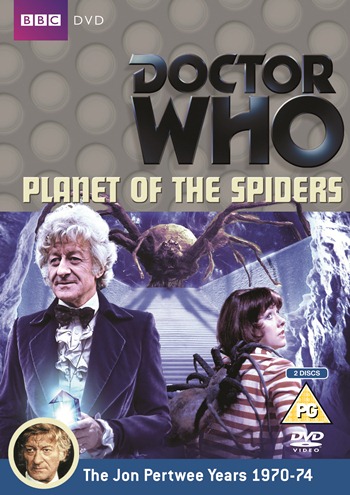
Aired on: 4 May – 8 June 1974
‘Planet of the Spiders’ brings to a close the Jon Pertwee era, offering a satisfying but far from flawless final adventure for the man who had seen Doctor Who through a major transition in 1970 and dominated screens for five seasons of adventures since. Although his final season has featured fewer UNIT-based stories, ‘Planet of the Spiders’ brings the organization back into the fray to provide a look back at so much of what has made Pertwee’s tenure so successful as well as to provide a heartfelt farewell.
In a time before story arcs became commonplace, ‘Planet of the Spiders’ offers plenty of callbacks to previous episodes. Aside from the Brigadier and Benton being back as part of UNIT, Mike Yates returns to satisfactorily atone for earlier traitorous actions in ‘Invasion of the Dinosaurs,’ Jo Grant gets mentioned as she returns the Doctor’s wedding present, and another immense chase scene featuring almost every vehicle imaginable occurs. Perhaps the programme has earned the right to indulge in its lead’s penchant for physicality and love of vehicles, but far too much time is spent with gratuitous action sequences that utlimately do not affect the actual story whatsoever. However, the story also plays to producer Barry Letts’s interests, the Buddhist and New Age philosophies that have permeated certain elements of previous stories really coming to the forefront as a cult within a meditative retreat has made contact with a group of hyper-intelligent spiders from the planet Metebelis 3. Led by The Great One whose expanding psychic powers threaten the entire universe, the spiders provide a rather unique threat within the confines of Doctor Who, even if the Buddhist symbology also adds little to the plot and is instead employed more as a means of providing a parallel between regeneration and reincarnation.
While the inclusion of the New Age crystal theory is actually used to good effect to explain how a single arbitrary spider could become one of the biggest threats in the universe, the climax and regeneration ultimately go against the New Age and Buddhist undertones of the story completely. With the Doctor apparently at fault for these events and commiting the sin of greed in his quest for knowledge, the theology switches to a very Christian view as the Doctor must die for his sins and be reborn. This in itself isn’t a terrible concept when taken in isolation, but the Third Doctor is certainly no more greedy for knowledge than any other regeneration, especially as he has continued to help his UNIT family even after being released from exile, and so the implied precursors of this necessitated regeneration as portrayed seem flawed. He is arrogant and full of pride, and ‘Planet of the Spiders’ has no issues showcasing its hero’s flaws, but greed is hardly the most prominent.
For as many things that go well with ‘Planet of the Spiders,’ though, there are certainly some flaws that keep it from reaching elite status. The villain, Lupton, must sadly go on this list, if only for the fact that he is ultimately forgettable. He is serviceable in his role as the everyman gone wrong with delusions of greatness, but he never does anything substantial enough to elevate himself beyond exactly that. Secondly, the Metebelis 3 set pieces certainly leave one wanting. Perhaps another victim of limited budget, the alien landscape consists of a few huts and blue backdrops with a cast of characters who seem less than fully invested into their roles or plight. Neska, in particular, for all of the lines and importance she is given, fails to deliver any sort of meaningful presence.
So, then, ‘Planet of the Spiders’ comes off as something of a mixed bag, plagued by the inevitable filler and pacing issues that often come with a six-part story and seemingly filling a checklist of items rather than cohesively telling one tale. The Doctor being presented in a less-than-ideal light as his personality flaws come to the forefront is an intriguing tactic, and Pertwee’s performance throughout as well as his Doctor’s ultimate redemption are superb. The returning UNIT cast members, Sarah Jane, and the once-disgraced Yates all perform admirably as well. Unfortunately, the cast and setting of Metebelis III only detract from the overall proceedings, and the villain back on Earth is only serviceable at best. The Great One, at least, proves herself to be a very formidable foe, and Pertwee’s acting against her heightens the sense of fear and dread, but the voicing and budget again keep the spiders from reaching a more memorable level. At the very least, Pertwee absolutely delivers in his final scenes, and with no ostentatious stunts or glitz, he quietly experiences a very dignified exit as he says goodbye one last time to the family he has come to care for and stand up for no matter the cost.


Hello! I’m doing a PhD thesis on the Christian and Buddhist influences on the view of immortality in Doctor Who, and would like to refer to what you’ve written here on the topic. Could you email me with your full name so that I can get the reference right? Thank you in advance!
Another excellent series of reviews for the 3rd doctor. Thank you.